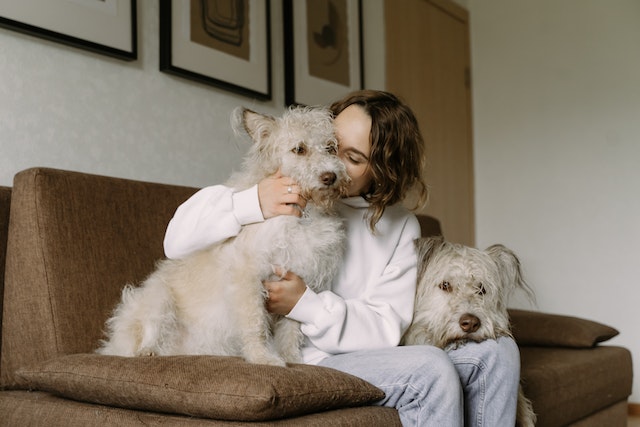Psychiatric assistance dogs play a vital role in helping people with mental health conditions manage their daily lives. These dogs are specially trained to perform tasks that help their owners cope with anxiety, depression, PTSD, and other mental illnesses. However, despite their importance, there is still a lot of confusion surrounding the legal status of psychiatric assistance dogs in the UK. In this article, we will explore whether psychiatric assistance dogs are legally recognized in the UK and the challenges faced by their owners.
The Legal Framework
The legal framework in the UK concerning assistance dogs is primarily governed by the Equality Act 2010. According to the Act, a person with a disability is entitled to be accompanied by an assistance dog in any place where the public is allowed to go. This includes shops, restaurants, hotels, and public transport. Assistance dogs are defined as dogs trained to help a disabled person, including guide dogs for the blind and hearing dogs for the deaf.
However, the Equality Act does not specifically mention psychiatric assistance dogs. Many people with mental health needs rely on assistance dogs to help them manage their conditions and may be concerned that these animals are not legally protected in the UK.
In reality, it is possible for a person with a mental health condition to keep an assistance dog provided they meet certain criteria. To be classed as an assistance dog, the animal must have been trained to help with a disability-related task and should not cause alarm or disruption when out in public places.
The law also dictates that anyone taking their assistance dog into a place of business has the right to ask for reasonable adjustments from the company, such as extra space for the dog to lie down. Businesses are legally obliged to allow assistance dogs and their owners access, failure to do so is a severe breach of the Equality Act 2010.
Under this law, people who rely on psychiatric assistance dogs are entitled to the same rights and privileges as those with physical disabilities who use assistance dogs. Psychiatric assistance dogs are specially trained to help people suffering from mental health issues, such as PTSD and anxiety disorders. These dogs help their owners regain control of their lives by providing calming companionship, helping to manage panic attacks or anxiety triggers, and providing physical support in a variety of different situations.
The positive impact that a psychiatric assistance dog can have on someone's life is immense. Sadly, there are still many people who do not understand the important role these dogs play and may be reluctant to grant access or assistance to owners with a psychiatric assistance dog. This is why it is so important for businesses, organizations, and members of the public to be aware of their obligation to grant access and assistance to those with a psychiatric assistance dog.
The Role of Psychiatric Assistance Dogs
Psychiatric assistance dogs are trained to perform specific tasks that help their owners manage their mental health conditions. These tasks may include interrupting self-harm behavior, providing deep pressure therapy, guiding their owner to a safe place during a panic attack, or waking them up from a nightmare. The dogs are trained to respond to their owner's specific needs and provide support when necessary. For detailed psychiatric assistance dog tasks, read this article Assistance Dog tasks for Psychiatric Disabilities.
Challenges Faced by Psychiatric Assistance Dog Owners
Despite the legal framework, psychiatric assistance dog owners in the UK still face many challenges. One of the most significant challenges is discrimination. Some businesses and individuals may not be aware of the legal rights of assistance dog owners and may refuse entry or service to them. This can include access to public places and transportation, which can severely limit the owner's ability to lead a normal life. Additionally, some people may feel uncomfortable around assistance dogs or have certain allergies. It's important to understand that these challenges can be addressed!
Another challenge is the difficulty of finding and training an appropriate psychiatric assistance dog. Psychiatric assistance dogs require a thorough understanding of the handler's needs and must be trained to help in specific situations. This can include behaviors such as standing between the handler and people in a crowded area, providing tactile stimulation during moments of anxiety or panic, carrying supplies for the handler, and more. To ensure that a psychiatric assistance dog is well-trained and properly suited to its handler's needs, it is important to find an experienced specialist who can help with the selection and training process. For reliable assistance dog training, check this out: We Help You To Train & Register Your Mental Health Assistance Dog With Our Trusted Partner
Legal Recognition of Psychiatric Assistance Dogs
The legal recognition of psychiatric assistance dogs in the UK is a somewhat complex issue. Although they are not specifically mentioned in the Equality Act 2010, the Act's broad definition of assistance dogs covers psychiatric assistance dogs. In 2018, the government issued updated guidance on assistance dogs, which made it clear that all assistance dogs, including psychiatric assistance dogs, are entitled to the same legal rights and protections.
Conclusion
In conclusion, psychiatric assistance dogs play a crucial role in helping people with mental health conditions manage their daily lives. While the legal framework in the UK recognizes assistance dogs, including psychiatric assistance dogs, some challenges still exist. Discrimination against psychiatric assistance dog owners remains a significant issue, highlighting the need for greater awareness and education around their legal status. It is essential that we continue to work towards greater recognition and protection of the legal rights of psychiatric assistance dog owners in the UK.













